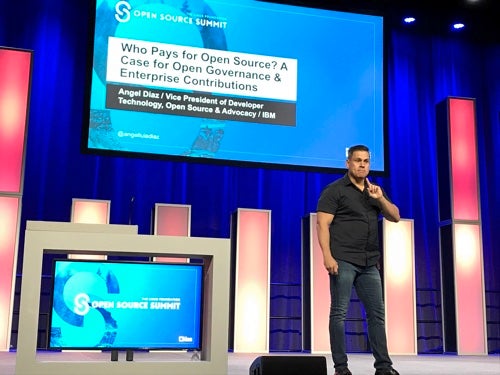Vancouver, B.C. – There is a misconception among some that open source is free. In a keynote at the Open Source Summit, Angel Diaz, Vice President of Developer Technology, Open Source and Advocacy at IBM, outlined who actually is paying for open source.
According to Diaz, the “second awakening” of open source technologies is now occurring with the growth of open cloud, artificial intelligence and transactional architectures.
“We are reinventing and democratizing technology and doing it in a way that is open and allows everyone to gain value,” Diaz said.
Diaz said that when asking the question about who is paying for open source, the question isn’t just about money for services and product, it’s about time and investment. From his perspective, there are three core groups that pay for open source: consortia, enterprises and individuals.
The Consortia includes groups like the Eclipse Foundation and the Linux Foundation, among many others. Diaz said that the Consortia has helped to establish the end user as a first-class entity for the consumption of open source software.
“Consortia has also helped us to realize that not all open source is created equal,” Diaz said.
He added that when an individual or organization is using a piece of code they want, they often need to know that it will be around for awhile and that there are ways to contribute. Those are tasks that the Consortia is good at helping to facilitate.
Enterprises
The enterprise is also a core group that pays for open source. Diaz said enterprises have responsibility to support the Consortia through financial commitments, sustained development resources and real world use cases.
Additionally, Enterprises pay for open source through code.
“You can’t just use it; you should also contribute,” Diaz said. “At the end of the day just because you can write a check doesn’t matter; influence comes from the people doing the work.”
Individuals
Individuals are the ones that have the responsibility to do the work of open source, in terms of writing the code that enables applications. For individuals, Diaz said mentorship is key, as is encouragement.
“You are either being helped or you are helping,” Diaz said.
“You have to be a doer and not a talker; you have to mentor people,” Diaz said. “Don’t be a drive-by committer, you have to build trust and do the dirty work, learn by doing, know the licenses and be authentic.”
IBM has multiple efforts now where it is encouraging open source development, including the callforcode.org initiative, which will award participants for open source efforts that help to improve humanity.
“In the end, when people ask who is paying for open source, that answer is that we all are, but it’s freaking worth it,” he said.

Sean Michael Kerner is a senior editor at ServerWatch and InternetNews.com. Follow him on Twitter @TechJournalist.

